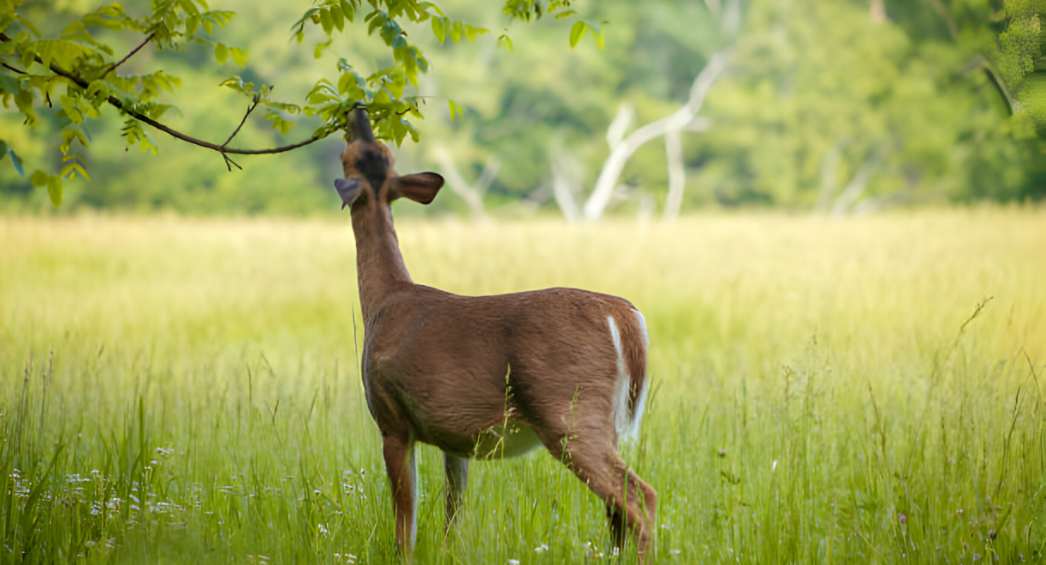Introduction
Deer are known for their wide-ranging diets, feeding on a variety of plants, fruits, and vegetables depending on the season and what is available in their environment. If you’ve ever wondered whether deer can eat oranges, or what kinds of foods they prefer, you’re not alone. As deer populations increase, understanding what they eat can help you manage gardens, orchards, and even just enjoy wildlife watching. In this article, we’ll explore whether deer eat oranges, what other foods are safe for them, and how their diet changes throughout the year.
1. Do Deer Eat Oranges?
While deer are opportunistic feeders, meaning they will consume a variety of plant matter based on availability, oranges are not typically their first choice. However, deer can eat oranges, and they may be attracted to them if other food sources are scarce or if the oranges are ripe and easy to access. The strong citrus scent of oranges may initially deter some deer, as they tend to avoid strong smells. But, if deer are hungry enough and the orange is readily available, they may not hesitate to nibble on it.
Factors Affecting Deer’s Willingness to Eat Oranges
- Smell & Taste: While citrus can be overpowering, young deer or deer in desperate need of food might be more inclined to try oranges, especially if they are part of a pile of food they come across.
- Season: During the late summer and fall months, when deer are foraging for extra calories to prepare for winter, they might be more open to consuming a wide range of fruits, including oranges.
- Ripeness: The sweeter and softer the orange, the more likely a deer is to be interested in eating it.
In general, oranges are not a preferred food for deer, but in times of food scarcity, they might be consumed if other food options are not readily available.
2. What Else Do Deer Eat?
Deer are herbivores and have a broad diet that can vary greatly depending on the season, geographical location, and food availability. Here’s a breakdown of what deer typically eat throughout the year.
Spring & Summer Diets
During the warmer months, deer are more likely to eat fresh, green vegetation that is abundant in nutrients. Their diet during this period mainly consists of:
- Grasses: Fresh, tender grasses are a staple for deer, providing them with essential nutrients during the growing season.
- Herbs & Plants: Deer often munch on wildflowers, dandelions, clover, and other plant species that are rich in vitamins.
- Young Trees and Shrubs: Tender shoots from trees like oak, maple, and birch are favored, especially in the spring when they are new and tender.
- Berries & Fruits: Deer will gladly consume berries like blackberries, raspberries, strawberries, and other soft fruits that grow in the wild. If fruit trees are present, deer might feast on apples, peaches, and pears.
Fall & Winter Diets
As temperatures drop and fresh vegetation becomes scarcer, deer turn to woody plants and stored food. Their diet in the fall and winter includes:
- Acorns: Acorns are a crucial food source for deer during the fall. They are high in fats and carbohydrates, providing energy for deer to prepare for the harsh winter months.
- Twigs & Bark: In the winter months, when fresh vegetation is minimal, deer will strip the bark off trees or browse on twigs and woody plants to meet their nutritional needs.
- Evergreens: Pine needles and other evergreen plants can be consumed, though they are not as nutritious as other food options.
- Corn & Grain: If deer have access to farmland or crops, they may feed on corn, wheat, and other grains. This can sometimes lead to deer becoming a nuisance for farmers.
Fruits and Vegetables
While deer primarily eat foliage, they will also consume a variety of fruits and vegetables if available. These include:
- Apples
- Pears
- Plums
- Grapes
- Carrots
- Lettuce
3. Foods Deer Should Avoid
While deer can eat a variety of foods, there are some items that they should not eat, either because they are toxic to them or simply not suitable for their digestive system. Here are a few foods to avoid feeding deer:
- Onions & Garlic: These are toxic to deer and can cause gastrointestinal distress or even lead to death in extreme cases.
- Tomatoes (Green): While ripe tomatoes are generally safe, green tomatoes contain solanine, a toxic substance that can cause illness in deer.
- Avocado: Avocados contain persin, which is toxic to many animals, including deer.
- Chocolate & Caffeine: Like many animals, deer cannot process chocolate or caffeine, which can be harmful to their health.
- Rhubarb: The leaves of rhubarb plants contain oxalic acid, which can be toxic to deer and cause kidney failure if consumed in large amounts.
It’s important to note that feeding deer processed foods or large quantities of human food can disrupt their natural foraging behavior and overall health. Feeding them anything outside of their natural diet should be avoided.
4. How to Attract Deer Without Overfeeding
If you’re looking to attract deer to your property for wildlife viewing, it’s important to do so responsibly. Here are some tips for offering deer food in a natural and safe way:
- Plant a Deer-Friendly Garden: Grow plants that deer naturally eat, such as clover, wildflowers, and shrubs like sumac and dogwood. These can attract deer while also providing them with nutritious food.
- Use Deer Feeders: If you live in an area where it’s legal, you can use a deer feeder to offer corn, grain, or fruits. However, be cautious not to feed deer too frequently, as this can lead to overpopulation and dependency on human-provided food sources.
- Avoid Feeding Oranges: While oranges are not dangerous for deer, they are not a natural part of their diet. Opt for local plants and fruits that are more beneficial for their health.
5. Why It’s Important to Understand Deer Diets
Understanding what deer eat and their dietary needs can help prevent issues such as garden destruction, crop damage, and overall health problems for the deer. By offering appropriate food sources and respecting their natural foraging habits, you can contribute to the wellbeing of local deer populations while enjoying their presence in your area.
Conclusion
To answer the original question: Yes, deer can eat oranges, but they’re not likely to prioritize them over other food sources like grasses, acorns, or berries. In general, deer are opportunistic eaters that will consume a variety of fruits, vegetables, and plants depending on availability and season. However, it’s always important to be mindful of what you feed them, as some foods can be harmful or lead to unhealthy feeding habits. If you want to attract deer or simply learn more about their natural diet, providing the right food options will go a long way in maintaining a healthy and thriving deer population.


